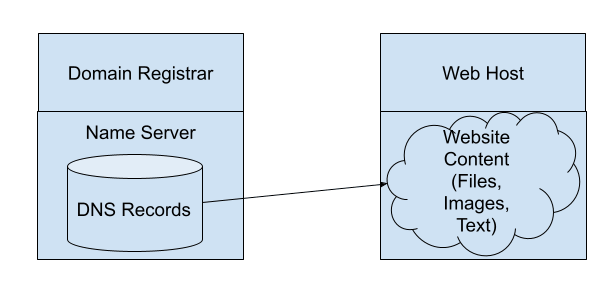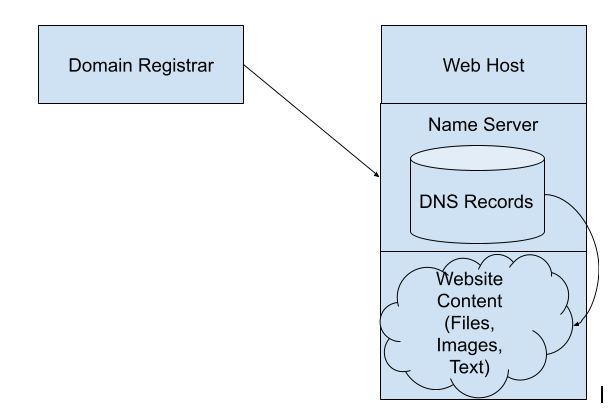So you have a new (or existing) business venture and decided to have a website. That’s when your website developer started talking to you in terms you didn’t fully understand. What is a Domain, Web Hosting, Email Hosting, and Domain Name Service (DNS) and how does this all work together? In this article, we will work to clarify what each of them mean.
For the purpose of this article, we will use an analogy of creating a business with an actual physical office as most people can relate. The analogy is not necessarily a 100% match with all the technicalities with respect to web hosting but it is good enough to give you a better understanding on how everything works. Let’s get started.
Domain Registration
Usually the first step in the whole process is to register your domain. Registering your domain is the equivalent of getting a business license with your local government entity. Much like (although not 100% exact) business names, domain names are unique across the entire web sphere. There are multiple places where you can register your domain. GoDaddy, Tucows, Google, so on, all offer domain registration. The most common domain ending is .com but there are many other options.
Web Hosting
Web hosting is the equivalent of a plot of land / lot to put your business onto. They offer you some basic computing services like storage, bandwidth, type of CPU(s), PHP, MySql, much like when you purchase a lot, you get basic services like electricity, water, sewers, cable, and so on. The quality of the website that you put on there is not related to the type of web hosting provided much like the quality of the building you put in your lot has nothing to do with the lot itself as long as the basic services are adequate for the needs.

Also If you don’t maintain your website, over the years its performance will slowly degrade much like a building would. With web hosting, the speed as to which this degradation happens is usually faster as updates to browsers happen quite often. Google Chrome was updated 9 times this year alone. Furthermore, over the years, the services provided need to be upgraded, perhaps for security (regulation in the real world) purposes, and you must then match them. For example, a few years ago Telus, our local internet provider, upgraded our internet hook up to fiber optic cable. We didn’t really have a choice and had to upgrade. The same can happen with web hosting.
Email Hosting
Email hosting is very much like web hosting but dedicated to the management and storing of emails. You can have email hosting without web hosting just like you can have web hosting without email hosting. They are independent of each other. In the real world, that would be the equivalent of having a business without a physical office and only have a P.O. box to receive your actual mail or having a business location where you don’t accept any shipping (I know that’s a bit more rare).
Domain Name Service (DNS)
Domain Name Service (DNS) is where the magic really happens. It is a service that informs your computer where to find the location of your website (its web host). It is the equivalent of a business directory. DNS records are the mapping between logical names that people understand and IP addresses that computers understand. DNS records are stored on what are called DNS name servers. So when you type www.14oranges.com in your browser, your computer contacts your local DNS Name Server and asks “where is this website hosted?” (obviously using technical protocols). In the same manner, when you send an email to someone@14oranges.com, your email server will find where the emails for the domain 14oranges.com are hosted (using what is called MX records which are stored with your DNS records) and must be sent to. The real world equivalent to all of this is that if you want to come and visit the office of 14 Oranges, you will look it up in a business directory or contact your local government that handles business registrations and find their physical or legal address. One difference in the real world is that usually the physical address is typically the same as the mailing address (although not always) while on the internet, it is rarely the case (although some hosting providers provide both web and email hosting).

There are a few options when it comes to name servers. Your domain registrar can be your DNS name server and store your DNS records. You can also have your web hosting company be your DNS name server. It can also be somewhere else like a CDN service like Cloudflare for example. As long as your domain registrar knows where your DNS records are maintained, all is good.


There are thousands of name servers on the internet all indirectly connected to each other via what is called root name servers. When you enter the mapping for your domain, for example www.14oranges.com is hosted at IP address 142.93.147.159 in your DNS records. Your name server then propagates that mapping to other name servers which then propagates it to other name servers until all of them have it. It doesn’t happen instantly and in some cases can take about 48 hours for that propagation to occur. That’s the equivalent of publishing a new business directory except it happens in real time and doesn’t kill any trees.
Conclusion
We hope this article helps you to understand how web hosting generally works and that the business analogy helped to clarify certain points. If this article is still making you feel queasy, no need not to worry, we offer all the services above and can take care of all of that so that you can just focus on your business. Just contact us and we would be happy to help.

Share This Article